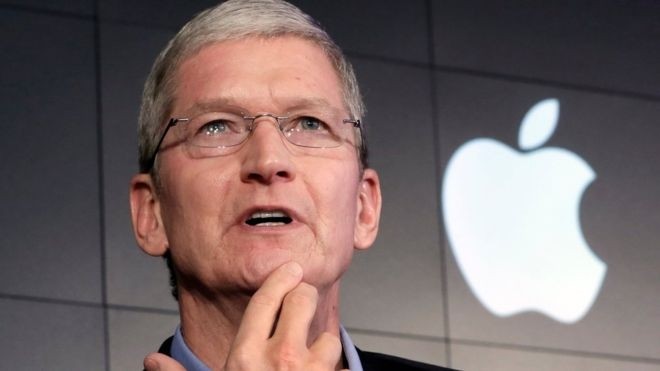 Tim Cook (Apple, Inc CEO)[/caption]
Tim Cook (Apple, Inc CEO)[/caption]
Tech giant Apple, on Wednesday resisted a demand by a federal judge to assist the Federal Bureau of Investigation (FBI) break into an iPhone used by one of the shooters – Syed Rizwan Farook – in December’s San Bernardino terrorist attack.
On Tuesday, in a significant victory for the government, Magistrate Judge Sheri Pym of the Federal District Court for the District of Central California ordered Apple to bypass security functions on an iPhone 5c used by the shooter, who was killed by the police along with his wife, Tashfeen Malik, after they attacked Mr. Farook’s co-workers at a holiday gathering.
The court order demands that Apple to build special software to bypass that mechanism, allowing investigators to guess passwords until the correct sequence is discovered.
Advertisement
However, hours later the Cupertino Company’s CEO Tim Cook posted an open letter to Apple’s website explaining his company’s decision to challenge the court order.
“We have great respect for the professionals at the FBI, and we believe their intentions are good. Up to this point, we have done everything that is both within our power and within the law to help them.
“But now the U.S. government has asked us for something we simply do not have, and something we consider too dangerous to create. They have asked us to build a backdoor to the iPhone.
“Specifically, the FBI wants us to make a new version of the iPhone operating system, circumventing several important security features, and install it on an iPhone recovered during the investigation. In the wrong hands, this software — which does not exist today — would have the potential to unlock any iPhone in someone’s physical possession.
Advertisement
“We can find no precedent for an American company being forced to expose its customers to a greater risk of attack. For years, cryptologists and national security experts have been warning against weakening encryption. Doing so would hurt only the well-meaning and law-abiding citizens who rely on companies like Apple to protect their data. Criminals and bad actors will still encrypt, using tools that are readily available to them.
“Opposing this order is not something we take lightly. We feel we must speak up in the face of what we see as an overreach by the U.S. government,” Cook added.
“We are challenging the FBI’s demands with the deepest respect for American democracy and a love of our country. We believe it would be in the best interest of everyone to step back and consider the implications.”
Farook and his wife Tashfeen Malik killed 14 people in December in a mass shooting at a county public health facility. The pair subsequently died in a gun battle with police. An iPhone was recovered from the scene but because investigators don’t know the passcode they have been unable to access the phone’s data.
Encryption is a huge source of tension between technology companies and law enforcement. Companies such as Apple, Google and WhatsApp protect the privacy of their customers by encrypting data, often in a way that even the companies themselves cannot unscramble. Although that allows unscrupulous users such as criminals or terrorists to communicate without government surveillance, tech companies justify such security measures by insisting that it’s impossible to allow law enforcement to crack encryption without opening the door for criminals themselves to do the same.
Advertisement
The FBI’s plan would bypass security functions that limit how many times you can enter an incorrect password. Currently, an iPhone wipes itself if the wrong password is entered 10 times in a row. With that feature disabled, investigators could simply enter password after password until they hit on the correct one.
In 2014, Apple and Google, whose operating systems are used in 96 percent of smartphones worldwide, announced that they had re-engineered their software with “full disk” encryption, and could no longer unlock their own products as a result.


